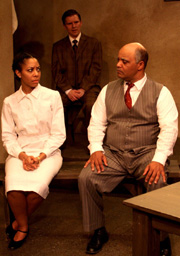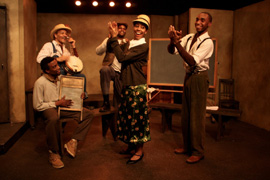
Paulanne Simmons
"Miss Evers' Boys" Explores the Lessons of Racism
"Miss Evers' Boys"
Directed by Melanie Moyer Williams
Red Fern Theatre Company
The Shell Theatre
Times Square Arts Center, 300 West 43rd St. at 8th Avenue
Opened March 19, 2009 - Closes April 5, 2009
Thurs. thru Sat. 8 p.m., Sun. 3 p.m.
Tickets: $18 (212) 352-3101
Reviewed by Paulanne Simmons March 29, 2009
"Miss Evers' Boys" began life as a 1992 stage play by David Feldshuh. In 1997 it was turned into an HBO television film starring Alfre Woodard and Laurence Fishburne. The film won four Emmy awards, including one for Outstanding Made for Television Movie.
 |
| L-R: Nedra McClyde, Alex C. Ferrill, and Evander Duck in "Miss Evers'boys." Photo by Gretchen Handloser. |
This season the Red Fern Theatre Company has once again returned the play to the stage under the direction of Melanie Moyer Williams. Watching it is a riveting, gut-wrenching experience that will not be easily forgotten.
"Miss Evers' Boys" is a fictionalized account of the infamous Tuskegee experiment, in which hundreds of black men were denied treatment for syphilis so the effects of the untreated disease could be observed. The experiment went on needlessly and cruelly even after penicillin, a definite cure, had been discovered. One part the hubris of scientists, two parts pure racism, the experiment can only be remembered with shame and disgust.
But what makes "Miss Evers' Boys" special is the way the play puts a human face on both victim and victimizer. It even sheds light on the shady areas where well-meant intentions fade into complicity.
The play is told through the eyes of nurse Eunice Evers (Nedra McClyde), Evers starts out administering real treatment, but when funds dry up, she agrees to give the unsuspecting men treatment that is nothing more than useless backrubs, with the promise that the men will be first on line to receive real treatment when more money arrives. In addition, they will be given fifty dollars in life insurance, no small amount to men who might otherwise be thrown into a canvass bag after death.
The four men under Evers' care whom the audience meets each all have their own unforgettable personality.
 |
| L-R: Garrett Lee Hendricks, David Pendleton, Marty Austin Lamar, Nedra McClyde, and Jason Donnell Bush. Photo by Gretchen Handloser. |
Willie Johnson (Jason Donnell Bush) is an eager, innocent young man who hopes to make his fortune through his ability to dance. Caleb Humphries (Garrett Lee Hendricks) is a bitter man, having lost both his wife and child. Although he is quite attracted to Evers, he is never completely convinced that her treatments work, especially after he finds out that everyone else with "bad blood" (the local name for syphilis) is getting penicillin shots. Hodman Bryan (Marty Austin Lamar) is a strong, illiterate farmer who still believes in magical cures. Ben Washington (the magnificent David Pendleton) is older than the other men. He has total faith in Evers. She has taught him how to write his name.
The experiment is supervised by a white doctor named John Douglas (Alex C. Ferrill), a man who deludes himself until the end with phony reasons for letting men die. Eugene Brodus (Evander Duck), a black doctor who works with Ferrill, goes along with the project, ostensibly because he thinks it will eventually help his people, but one suspects really because it will aid his ambitions.
 |
| Garrett Lee Hendricks, David Pendleton, Jason Donnell Bush, Marty Austin Lamar, and Nedra McClyde (clockwise from bottom left) in "Miss Evers'boys." Photo by Gretchen Handloser. |
The play is told as a flashback, as Evers testifies before the 1973 Senate hearings. The aged nurse pleads her case, but she is obviously wracked with guilt. This may all sound extremely grim, but the play is continually lightened by the dancing of the men who form a troupe that competes in local dance contests, as well as their general good sense and good sense of humor.
Bush is especially light on his toes and Michael Blevins deserves credit for fine choreography created for a small stage.
"Miss Evers' Boys" is particularly effecting in the way in charts the physical and mental changes lack of treatment produces in the men. By the end of the play, Pendleton manages to transform himself to such an extent it was hard to recognize the same actor.
"Miss Evers' Boys" proves unquestionably that
the road to hell is not paved with good intentions, It is paved with bad
intentions we tell ourselves are good.
| museums | NYTW mail | recordings | coupons | publications | classified |
